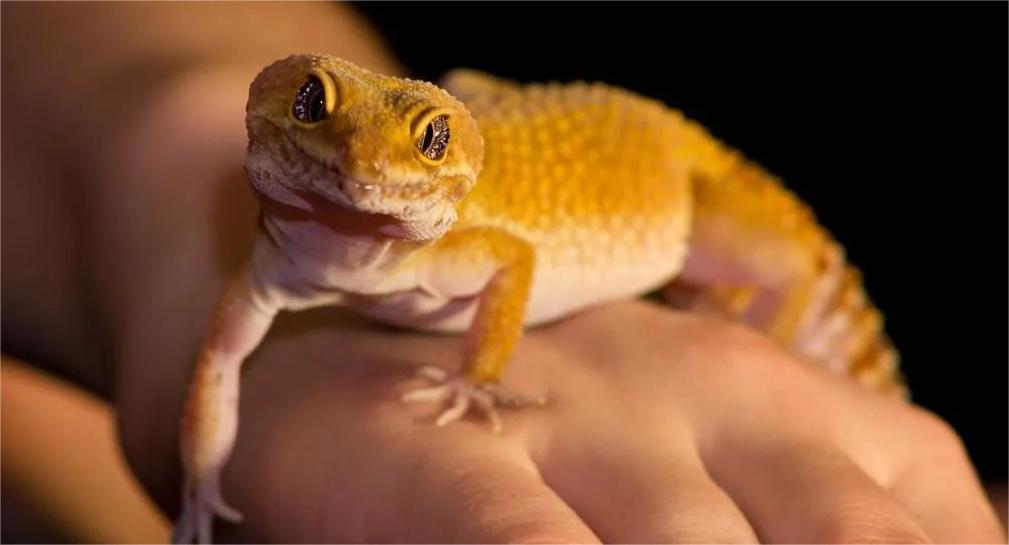Big eyes, smiling face, cute little tongue...the more I get to know them, the more I love them.
Today I'm going to share with you what we need to prepare if we want to keep a leopard guardian. Also combine some of my own breeding experience to share with you some of the things that I think we need to let you know or pay attention to.

Breeding environment
First of all, I would like to share with you the basic environmental facilities for keeping Leopard gecko.
1.Breeding box
The first thing to prepare is the feeding box. The most common feeding box on the market is the reptile feeding box in the picture below. There are three models of this box: large, medium and small. The large feeding box can fully meet the basic space needs of an adult Leopard gecko.
That said, to save time and money. Even if your Leopard gecko is still a baby, you can still purchase the large box.

Of course, if you look into it, it is inevitably better to gradually replace the box with one that suits its size, from small to large. On the one hand, it will feel more secure; on the other hand, the box is too big, and the small gecko will probably not be able to find food.
Therefore, if you choose to use a large feeding box to keep a very small gecko, it is better to provide a hiding place for it and pay more attention to its diet at the same time. You can drop a portion of the breadworms from the food bowl directly into the feeder box to make it easier for the gecko to find them. If it still isn't eating, you can also try hand-feeding it upfront.
In addition to this more common and cost-effective breeding box, acrylic boxes, or glass tanks are also available. This depends on personal preference.
[Note] In the choice of feeding box, on the one hand, we have to consider its breathability. On the other hand, we also need to consider whether the material is easy to heat in winter in combination with the heating equipment we are going to use later.

2. Food bowl
As for the food bowl, you can choose according to yourself as well as the gecko. There are three main types of food bowls on the market: ceramic, glass and plastic.
My leopard gecko is quite naughty, and will often dig up the paper pads. If the food bowl is made of plastic, it will be easy to be tipped over (except for the plastic food bowl that can be fixed with the feeding box). Especially the adult leopard gecko, the strength is not small. Therefore, if the conditions allow, it is recommended to choose ceramic or glass food bowl.

And when it comes to the choice of style, usually the food bowl that actually holds the food is chosen with an anti-escape feature. After all, the leopard gecko needs to feed live breadworms or barley worms of some kind, and if the worms are crawling all over the tank, the image is still a bit too beautiful.
As for the food bowl for other things (water or calcium vitamins), just a regular one will do.

We can also use our own discretion on the number of food bowls in relation to the actual situation. Generally speaking, is need at least two. One for food and the other for water. If we choose this way, then we need to mix the calcium powder and vitamins directly into the food.
You can also prepare three food bowls to put food, water, and the dispensed calcium powder and vitamins.
[Note] If you place the calcium powder and vitamins separately, but the gecko doesn't eat them, then it is recommended to put the prepared calcium powder and vitamins in the food. It is recommended that you mix the prepared calcium and vitamins into the food of the leopard gecko so that when they eat the worms, they eat them directly.

3. Hide Cave
Hide cave is something we can prepare, but it's not a necessity. We all know that gecko is a nocturnal animal, which means they are afraid of bright light. Therefore, the main purpose of the hide cave is to provide a relatively dark environment for the gecko, to increase the sense of security. At the same time, the prongs of the hide cave can also play a role in assisting the gecko in shedding its skin when the leopard gecko sheds its skin.
If we don't provide the leopard gecko with a hide cave, we need to pay attention to the shade of the feeding box. You can also put a little bit of angular things in the box, as a way to help the leopard gecko peeling.
For example, a small piece of sunken wood, a small stone with a little edge, etc.. Of course, this is not necessary. For very healthy geckos, they are perfectly capable of shedding their skin on their own.
When choosing a hide cave, we have to consider whether the size of the hide cave is habitable for adult leopard gecko. In fact, the growth rate of the gecko is still relatively fast, and it is not recommended to buy a very small hide cave.

4. Heating pad and thermostat
A heating pad is a necessity for keeping a leopard gecko. Or rather, if you want to keep a leopard gecko well, a heating device is a must-have.
You can choose the simplest heating pads or other heating devices such as reptile cabinets that come with heating as well as temperature control. If you only have one or two, I personally think that a heating pad with temperature control is enough. Of course, if you are more after aesthetics, you can also consider reptile cabinets.

[Note]
①Heating pads must be used with temperature control. The current market has the so-called heating pad with temperature control. In fact, there are several temperature selection gear. But you actually use the measurement, you will find that the actual measured temperature is much higher than the temperature of the product description.
Of course, this situation may not be all. You can actually measure their own, for insurance purposes, we recommend that you do not take chances, or with the temperature control is better;
② The heating pad is better placed on the bottom than the side. Spread on the bottom, more conducive to the leopard gecko with the help of the heating pad temperature digestion of food. However, it is important to note that the heating pad should only cover two-thirds of the bottom of the box. Provide the leopard gecko with a cooler and hotter environment so that it can make its own choices.

5. Substrates
The choice of substrates is relatively wide, common kitchen paper, kraft paper, corn cobs, reptile sand and so on. It is recommended to use kitchen paper or kraft paper for juvenile leopard gecko, which is easier to observe the feces of the little gecko.
Of the several types of substrates, I personally recommend kitchen paper the most. It is cost-effective and easy to observe. And kitchen paper is also more absorbent.

Diet
1.Food
There are also a wide range of foods for leopard gecko, such as breadworms, barley worms, crickets, corn worms, dubia cockroaches and so on. Among them, the most widely fed is still breadworms. There are several other foods that are not easy to feed, and there are also some that are best not to feed more for the leopard gecko. For example, crickets can be noisy and are not good to feed, while barley worms and corn worms are not recommended to be fed much. So to be on the safe side, we'll just stick to feeding bread worms.
But note that it must be live breadworms! So, if you really like the leopard gecko but can't accept its food, it is also something to consider carefully.
Although it is said that there are currently some supplements on the market that can replace this live food, but after all, there is still a difference. Personally, I think it is better to follow its nature and feed it live food.

2.Nutritional products
①Calcium powder + vitamins. This is necessary for the healthy growth of the gecko as the leopard gecko's own food is relatively homogenous. If you only have one or two, it is recommended that you can purchase a split pack. But be sure to look for some more reputable stores to buy, after all, the split packs are actually easier to fake.
Generally speaking, the ratio of calcium powder to vitamins is 1:3. If you find it troublesome to mix it by yourself, you can also buy the kind of mixed ones directly.
②BAC. This is not a necessity. It mainly serves to regulate the stomach and intestines. Generally, if the gecko doesn't have indigestion or other problems, you don't need to use it. Of course, if you are not sure, you can also feed a little bit regularly to help gecko regulate.

3.Water
The water used for keeping leopard gecko can be either cool white water or pure water, but it is not recommended to give tap water directly. Meanwhile, if you choose a kind of water, it is recommended not to change it frequently.
In the summer, you should also pay attention to the regular replacement of new water for the leopard gecko!

Conclusion
The last point to remind you is that it is better to keep leopard geckos individually and not mixed.
First of all, male leopard gecko raised together, will fight. The kind of fights that don't end until dead. When males and females are kept together, there is still the possibility of fighting.
And when females are kept together, we need to consider their size, and we also need to keep observing them during the daily feeding process to see if they are both able to eat enough food, and if there is a situation where one side is suppressing the other side. All in all, it is more troublesome, so I personally recommend keeping them individually.




1169件のコメント
dXsOhGUfcTpRqkoj
OxTmXufyi
RDgjMzrPoxEZCW
ymrfFVNQHKUGnLEi
qaKDYfPwoQkHCs